#because I really like clever parallels and try to cram as many in as I can
Explore tagged Tumblr posts
Note
WIP ask game! Top Sneaky!!!!
uehehehehhehe
The premise of the AU is pretty straightforward: Shinichi knows magic is real, while Kaito is the skeptic.
The way it works in practice is: Shinichi's transformation into Conan is a result of a curse instead of a drug, with the Black Org being more akin to a cult than a mafia. And, although Kaito still takes up the mantle of KID just like in canon, in this universe he gave up on his dream of being a magician shortly after his father's death. (Instead, he's getting an engineering degree. He's bored and aimless outside of heists.)
One of the aspects I'm most excited about is some really intertwined mythological symbolism that I want to work into a prophecy, but trying to make everything that I want actually fit is just sort of making things more difficult for myself lol rip
And I keep getting stuck on what direction to actually take the plot in general, so I only have a couple of chapters written so far and even those are kind of a mess imo. (´・ω・`)
Anyway, here's a generous snippet from a section that I like:
-
“Haibara, I think I was right about him.”
“Good morning to you, too, Kudou-kun,” she replied without looking up from her desk.
“He was avoiding the subject entirely,” Shinichi continued as if she hadn’t spoken, depositing his bag on the floor and leaning absently against the corner of the lab bench. “You said yourself that the moonlight thing was suspiciously occult, but when I pressed him for details he would only say he didn’t want anyone else getting involved.”
Haibara swiveled her chair around, and Shinichi caught a glimpse of half-melted candles surrounding a bowl emitting a worrisome amount of dark green vapor. “That doesn’t mean what he’s hiding is necessarily magic, let alone related to the Black Organization,” she said. Shinichi started to protest, but she went on, “And even if he is in the know, there’s no way to be sure he’s trustworthy.”
Shinichi took off his glasses to rub at his eyes. “We’ve been over this. If KID really has been keeping his knowledge of the supernatural a secret all this time, then his actions up to now would point to him being on our side. Why would he keep putting himself at risk with these high-profile heists? Why would he only use ordinary stage magic tricks? The most likely answer is that he’s taunting someone. Trying to get their attention.”
Haibara only crossed her arms, unmoved. Stubborn, Shinichi growled internally.
“And,” he continued, “if he’s looking for some kind of magic gemstone, which I’m now all but certain he is, then he’s probably trying to reach it before that same enemy gets their hands on it.”
“And you think that enemy happens to be our crows.”
“You don’t?”
She stood up, flicking some kind of powder into the bowl that caused the green steam to fizzle out with a pwoof, and crossed the length of the lab until they were standing nearly nose to nose. She stood a few centimeters taller than him now, having hit her growth spurt sooner, and she never failed to use that fact to her advantage during an argument. “I think even if Kaitou KID is after them, he’s too much of a wildcard to rely on if things get dicey—and they will, if you plan on taking the fight to the Organization. He’s a lone wolf, Kudou-kun, not to mention a wanted criminal. If he doesn’t want your help now, what makes you think he’ll cooperate when you insist on sticking your nose even further into his business?”
You don’t know him like I do, Shinichi almost said, but he realized how that would sound and thought better of it. Instead, he pulled himself up as tall as his grade-schooler height would allow and insisted, “If we’re on the same side, he has no reason to hinder our operations. I still think we should offer to share intel.”
Haibara looked dangerously close to rolling her eyes, but she backed down. “It’s not like I can stop you once you’ve made up your mind.”
Shinichi frowned. “You know I wouldn’t suggest this plan unless I really thought it was our best option, right?”
She sighed. “I do know that. And I know you’d prefer to convince me to agree rather than go against my wishes.” She leveled him a serious look. “But, Kudou-kun, there are some subjects where I think even you have blind spots. If you’re going to insist on getting that thief involved, at least do your best to not let your feelings get in the way.”
He blinked. “What the hell is that supposed to mean?”
She really did roll her eyes this time.
#ask#dragonsorceress22#my fic#I'm vulnerable to a trap with AUs where I try to keep things TOO close to canon#because I really like clever parallels and try to cram as many in as I can#but sometimes I end up stifling myself with that thinking and make the AU too boring or stagnant#I kind of worry that I'm on the edge of that with this fic. like maybe Kaitou KID shouldn't be magician-adjacent at all#but if I change that detail then I'll have to start a lot of stuff from scratch and auuughggh so that's why I'm stuck lol#oh also the filename being ''Top Sneaky'' is literally just because it was intended as a gift for someone#so I was keeping it secret. but because I ran into a wall with it I ended up having to gift just the first chapter lol rip#EDIT: ALSO I keep forgetting that I want to keep KID as a magician to parallel Houdini. who was a famous skeptic of the paranormal#so I'm incentivized to keep that aspect in#even though it might make his exact personality and motivations in this AU a little tricky to work out
2 notes
·
View notes
Text
Thoughts on The Witness
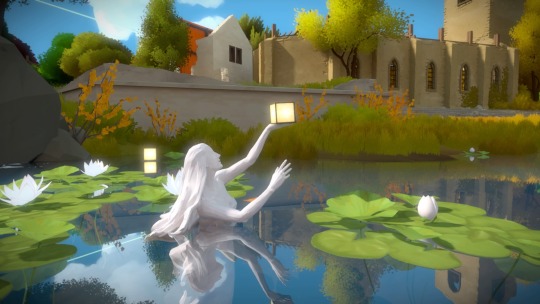
[no spoilers... this game would be nearly impossible to spoil in text]
Where do I even start?
I guess one thing to know about The Witness is that you can watch the famous 9-minute tracking shot from Nostalghia - where Oleg Yankovsky tries to walk a candle from one end of a drained pool to the other without extinguishing it - in its entirety. (I think it’s the entirety, I left before the clip was over; yeah, Jon, I get it.)
How do we interpret this? I haven’t watched Nostalghia, but I know that scene. Every film major knows that scene. Tony Zhou cited it in discussing lateral tracking shots, how they emphasize environment and create emotional distance from humans in the frame, and how Tarkovsky uses this to make the sequence lonely and arduous. Kyle Kallgren cited it in discussing how YouTube makes critique of certain types of art difficult, and Content ID essentially decides for us what film as a medium is even for.
Jon Blow plays the clip in full with no commentary - or, rather, the game itself is the commentary. There’s a sequence in Indie Game: The Movie where Jon Blow expresses some pain about how his game Braid was received, how he felt no one who played it ever really understood everything he was trying to say with it. That feeling might be ameliorated if he weren’t such a constituionally obtuse motherfucker.
Perhaps the scene is meant to draw parallels between Yankovsky’s dedication to a task that is simple yet difficult and the game’s puzzles, built, as they are, around complexity-through-simplicity. Except, Yankovsky’s Andrei has a personal investment carrying this candle, one Tarkovsky has spent the entire film setting up. I was about five hours into The Witness when I found this clip - more than twice the duration of Nostalghia - and I still didn’t know why I was solving the game’s puzzles or what they were trying to communicate.
Perhaps the scene is meant to draw parallels between the patience it encourages in its audience and the calm, meditative mode all The Witness’ allusions to Buddhism are seemingly on about, to give yourself over to the time investment the game demands of you. Except, Nostalghia asks you to spend nine minutes thinking about one thing; zen Buddhism encourages you to think of nothing; The Witness asks you to spend between fifteen and forty hours thinking about a zillion things. It is not a game about clearing your mind, it’s about filling your mind up. There is little continuity between the thoughtless peace of meditation or Yankovsky’s emotional collapse and the game’s intended “aha” moments.
But the ambiguity, the contextlessness of the scene’s inclusion, means you can’t be sure whether it’s contradictory. If we assume it’s about dedication, and we find a flaw in that worldview, maybe the problem is that we didn’t assume it was about meditation. And vice versa. If it fails to communicate, maybe the problem is us.
The only thing this scene communicates for sure is that Jon Blow wants me to know he watches Tarkovsky.
Jon Blow wants you to trust he knows what he’s doing. That the game is saying something. He also never, ever wants to tell you what it is. (If he could just tell you, he wouldn’t have spent eight years making it into a game, I suppose.) But this operates on completely opposite rules to the puzzles. Puzzles in The Witness are maze-drawing panels with increasing numbers of rules, all conveying their rules nonverbally, through gameplay. You see a symbol you don’t recognize, or a shape you don’t know how to draw, and you try things out, you make assumptions, you fail repeatedly, and then something works, the panel lights up, and you know you got it right. Now you understand what the symbol means.
The theming doesn’t work that way. Whatever theory you have as to what the game’s about, there will be no moment of clarification. Blow has an incredible talent, in fact, for constructing imagery that is hilariously blunt yet still ambiguous. As with Braid, where he crammed a straightforward narrative about memory and regret with allusions to quantum physics and the atomic bomb, The Witness references Einstein, the Buddha, Richard Feynman, romantic poetry, tech culture, game design, and - most of all - itself.
I realize I’m dancing around the subject here, because what the gameplay is (or isn’t) in service of is far easier to talk about than the gameplay itself. The Witness is a big island full of touch screens where you draw lines on grids. That’s it. The island is dense with structures and biomes, impossibly having a desert, a swamp, and three different kinds of forest which appear to be in four different seasons. What it doesn’t have is any reason why you’re there or a justification for solving ~600 line-drawing puzzles other than because Jon Blow wants you to. I was wrong in my video from 2015 to call The Witness narrative-based; the game contains narrative but it is not a narrative game. The island is very pretty, meticulously crafted, and not trying in the slightest to look like a real place. It is Myst minus everything people like about Myst.
Absent a reason for my character - if I’m even playing a “character” - to solve the puzzles, why am I, the player, solving them? The short answer is, “Because they’re there. You knew what you were buying. You solve the puzzles because it’s a puzzle game, do I gotta draw you a diagram?” (No, you need me to draw 600 diagrams.) That is unsatisfactory because the island is clearly more than an elaborate menu system.
Do I solve them because they’re interesting? I mean, they’re not bad, if you’re into Sudoku or, like... cereal boxes. In and of themselves, they’re not my cuppa. People told me about a repeated sense of epiphany the game provoked for them, but that’s not the way I experienced it. Every puzzle is so carefully tutorialized that I never felt I was making an intuitive leap. There is no lateral thinking in The Witness, it is strictly longitudinal. You get a row of puzzle panels, and you take them one by one (you are, in fact, prevented from jumping ahead), each one building on what it taught you. And they get hard, certainly, but each is the logical progression of the one before. And each is a marvel of nonverbal communication, but that’s more Jon being clever than it is me. This is not to judge people who did get a feeling of discovery; one person’s “aha” moment is another’s “yeah, Jon, I get it.”
(Aside: I did get a proper “aha” moment when I came to a panel that could be solved two ways. It controlled a moving platform; draw one line, the platform moves right, draw the other and it moves left. And I thought, “Huh, I guess I get it, but those shapes seem kind of arbitrary.” But then, while it was moving, I realized the platform itself mirrored what I had drawn; the two designs were what shape the platform would take when connected with each endpoint! And I went “oh fuck, oh fuck, that’s clever, that‘s really clever.” My first epiphany. It was the most Myst-like the game got, it was clearly not the kind of experience Jon Blow was interested in recreating much, and it took place 7 hours in.)
Do I solve them because I’m compelled? In the first play sessions, I asked myself several times, “Do I even like this?” The game is often tedious and frustrating and I regularly muttered “fuck off, Jon.” But I kept playing. I got annoyed when people interrupted me. I got a hideous case of Tetris effect. They’re not the kind of puzzles you can spend the day thinking through, like you would with Myst or Riven; they’re too abstract to visualize without them right in front of you. And the world is pretty but it’s not a place I wish I could visit, like I would with, again, Myst or Riven. But I kept going back. I solved puzzles less because I found pleasure in finishing them than I found displeasure in them being unfinished. Jon Blow has given talks on how game design focused on being “addictive” is basically evil - his word, not mine. And yet... it felt more like I was playing his game because I was hooked than because I was enjoying myself.
Do I solve them because I trust Jon Blow? Because I believe this will all amount to something? Jon certainly expects me to trust him. The game blares PROFUNDITY AHEAD constantly. (I remind you it quotes the Buddha.) But, in the years since Braid, I have grown less impressed with Jon Blow’s “art game genius” shtick. One fun bit about playing The Witness so late is finally reading all the discourse, and, well before finishing the game, I had read the thoughts of Andrew Plotkin, and Liz Ryerson, and Andi McClure - all of whom are brilliant - so I had a pretty good idea of what I was getting into. What’s surprised me is, having gotten to the first ending - not the secret ending - what the game is up to still isn’t clear. There are enough allusions to heady ideas that you can infer some stuff, but the default ending - while pretty enough - adds nothing and reveals nothing. And getting the True Ending means completing the In the Hall of the Mountain King section, something many will never find and precious few will ever complete. (Debating whether I’m going to even try.) If Jon Blow wants you to trust that he’s going somewhere with this, he makes you wait a long time before finding out if it’s worth it. [EDIT: turns out the secret ending comes after a different set of obscure puzzles than Hall of the Mountain King.]
Which leads me back to my original conclusion: I am solving the puzzles because Jon Blow told me to.
I suspect the arc Jon wants is for me to begin solving puzzles because I want to know what they’re in service of, what point Jon is trying to make, and then spend so long on them that I forget about the destination and just wrap myself up in the work, and, after dozens of hours on the hardest of the hard puzzles, Jon will finally reveal that the point he was making was about the labor I have just done. That he couldn’t tell me what it was for until I’d already done it. That the labor was its own reward. And how much you like The Witness is going to depend on whether or not you feel ripped off.
The overall impression The Witness left me with was less of meditation than discipline. (I have joked that playing The Witness feels like being in a D/s relationship with Jon Blow and not knowing the safe word.) Jon presents a simple concept and then expects you to solve every. single. permutation. of that concept. You do the work to find out what it’s about, and then what it’s about is the work. That game is about itself. The subject of The Witness is solving The Witness. It’s about purity of design, about simplicity, about slowly mastering a set of skills. (That these skills are neither inherently pleasurable to perform nor applicable in any other context seems not to matter; the point is, you learned them.) It’s hard not to read a game fixated on the beauty of its own design as all kinds of smug.
I allowed myself to be spoiled on the True Ending, and it seems, in the eleventh hour, if you draw lines til your fingers bleed, the game makes room for self-critique, questioning whether all this dedication to design actually is, in any way, meaningful or useful to us. Which, just a little bit, smacks of an artist spending two years making a sculpture of himself, chiseled to make him look a perfect Olympian beauty, only to label it “EGOISM.” Ooo. Make you think.
I suspect, in the end, I played it to (partial) completion because I was curious. I didn’t necessarily buy Jon Blow’s hype, but his hype is intriguing. As a portrait of a certain mindset, a monomaniacal obsession with design for design’s sake, the folk-religion of salvation through technology, and the critique of same, it is fascinating. I know people - smart people - who genuinely love this game, and, if the above is any indication, I clearly love talking about it. I have no regrets.
But, word of advice: if you don’t a) love the puzzles, or b) love the discourse, just walk away. Everything will be fine.
65 notes
·
View notes
Text
Avengers: Endgame - Review
5/6/19 **SPOILERS**
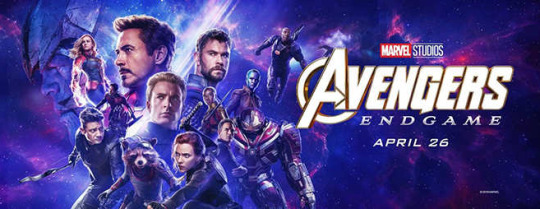
Directed by Joe & Anthony Russo (Marvel Studios/Disney)
The original Iron Man came out a year after I turned 18 and graduated high school. Effectively, the Marvel Cinematic Universe began as soon as I started my adult life, each film acting like 2 or 3 checkpoints every year, always giving me something to look forward to. While I haven’t loved or liked every movie so far, the MCU has been incredibly consistent, slowly increasing in quality on average as time goes on, not to mention having that sentimental factor of facing the world along side it. Scale has also increased in these films over time, seeing more and more team-up movies with larger and larger casts crammed on screen. Endgame is the biggest super hero movie of all time, and not just based on box office earnings, but based on fan expectations, concluding such an incredible saga.
The Russo brothers have been a godsend to the MCU, directing what are most of the top tier entries so far, including The Winter Soldier, Civil War, Infinity War, and now Endgame. While Infinity War was essentially Thanos’ story, Endgame shifts perspective back to the heroes, picking up the pieces and desperately trying to undo what Thanos accomplished. Endgame is sometimes overwhelming (in a good way), with several instances catching myself holding my breath. One of the best things about this film is the level of pay-off it gives for those who have followed the series since the beginning. While I don’t think I enjoyed it more than Infinity War, Endgame is certainly one of the biggest super hero movies of all time, but sometimes the logic of the story detracts from the emotion and memorable moments of the film.

The movie picks up 5 years after Thanos’ genocide. The remaining Avengers discover a possibility to use the quantum realm (Ant-Man’s shrinking machines) to go back in time and collect the infinity jewels before Thanos does. While this is a “time travel” movie, I like the explanation that Bruce Banner gives that you simply cannot just go back to an earlier time and change the current present; going back in time is like visiting an alternate dimension where what you do does affect that timeline, but yours when you go back continues as its been. This essentially takes care of the “grandfather paradox” of why you couldn’t just go to the past, kill Hitler, changing history for the better. You could tell the writers of this film anticipated question most theater-goers would ask, like “why not just go back and kill Thanos as a baby?” and things like that.
After being rescued from space by Captain Marvel, Tony Stark has officially retired from being an Avenger. He understandably has lost the battle, and resides to live his life with Pepper Potts and their 5 year old Morgan. Tony’s home life and dynamics with his daughter are some of my favorite moments in the movie, as it further humanizes Tony, and offers even more deconstruction of super heroes this series is known for. When the other Avengers think of a possible way to fix everything, I actively wanted them to leave Tony alone and let him have his earned life of peace, even if half the universe was killed off. But, being the guilty genius he is, he can’t fully let it go, and works with quantum tech to make a time machine for the heroes to use. Quickly, they develop a plan to split off and go to different teams and time periods, and retrieve the infinity jewels from their original known locations.
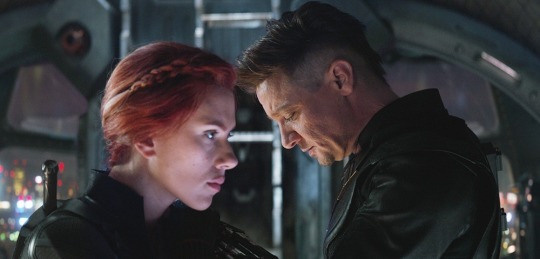
Seeing the current Avengers physically revisit famous scenes from prior movies was incredibly satisfying and felt like an appropriate use of fan service. Some of the best scenes of the entire movie are current heroes accidentally meeting up with themselves in the past, or accidentally coming across people they miss dearly. One of the scenes that come to mind are Steve Rogers meeting his younger self during the events of The Avengers (2012), and the ensuing duel. It instantly reminded me of playing a fighting game with your friend, but you’ve both picked the same character. It was one of the most and creative and clever moments of the movie. The other best time travel moment easily goes to Tony revisiting the 1940′s and having a hear to heart with his unwitting father, getting closure and a feeling for full circle his character didn’t even know he needed.
One one the complaints I do have about the story is that Thanos is no longer the same Thanos from Infinity War. When problems emerge during Nebula’s trip to the past, Thanos from that time period learns that someday he is successful in using the infinity jewels to wipe out half the universe. Through convoluted events, he is able to travel to the future (Endgame’s present) where he faces the Avengers head-on for trying to spoil his plans. This means the Thanos of this film (B) isn’t the same Thanos as in Infinity War (A), as he hasn’t done anything from those events yet, nor has any history with the heroes. Thanos B also seems to have a more malevolent and less complex attitude about using the infinity jewels, and comes off more as a typical bad guy, and less of a complex emotional psychopathic environmentalist, which is what made his character so interesting in the first place.
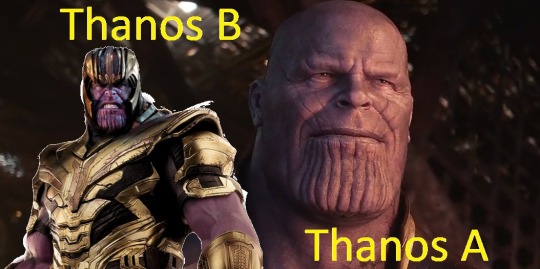
The other major issue I have with the film is its seemed to shoot itself in the foot with all the time travel multiverses. The movie feels like it breaks its own rules for the sake of the big emotional character scene at the very end. I’m of course referring to “Old Cap” and how he somehow went back to the past to live out his life with Peggy Carter, yet was able to show up back in Endgame’s timeline as an aged man to pass off his shield to Falcon. Once he went into the past, he, by this movie’s own rules, cannot appear back in the regular timeline because visiting the past is basically a parallel universe. What makes it doubly bad is that it’s not in Cap’s character to simply allow the world to go through the turmoil it did while standing aside through all of it. Don’t even get me started on how this would have affected Peggy’s life and the entire conception of SHIELD. If someone can explain to me how this was all possible, please do, otherwise, it felt like either a genuine mistake, or more likely, the movie bending its own rules for the sake of a payoff (which left me scratching my head and took the emotional impact completely out of the final scene of the movie).
However, I’m extremely happy with the rest of Captain America’s scenes. Aside from the scene mentioned earlier (Cap vs. Cap), his use of Thor’s hammer in the end battle was incredibly satisfying and cathartic. I’ve always felt that if anyone was “worthy” of being a good person and warrior, it was always Captain America. Why he could barely budge Thor’s hammer in Avengers: Age of Ultron is beyond me (unless he was faking it to protect Thor’s feelings). Hell, if Vision could lift the hammer, why couldn’t Cap before now? Cap also gets a lot more time on screen in general, which was nice after barely having any lines or presence in Infinity War. Hawkeye, Black Widow, and other side characters also get their best moments of the entire series combined, and it was nice to see the regular people among the Avengers still have emotionally and plot poignant scenes as good as the super heroes.
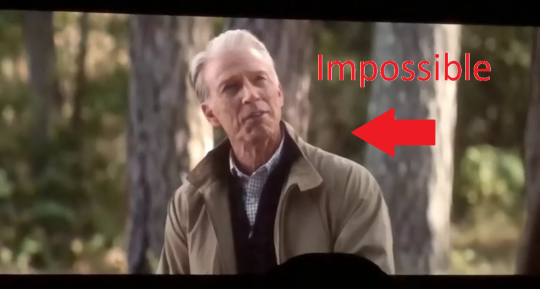
Thor’s story arch could be seen as criticisms of the film as well. While the universe in its throws of coping with half of all life disintegrated, and how that would affect hugely every aspect of life, Thor meanwhile settles for comically getting fat and doing absolutely nothing. While I still found Thor in-character and funny in this film, upon further speculation, I really wish Thor continued the high he rode after passing what was his darkest chapter in Infinity War. I thought Thor finally settled into his own, and was confused why he regressed into a gag, even if I found it humorous at first. But, I was thankful certain other characters didn’t steal the limelight, especially Captain Marvel. I still find her way too powerful and her personality wildly unlikable and inconsistent. I tried to defend her character in her own movie back in March, but seeing Brie Larson once again strutting her ego made it impossible to root for a supposed underdog. One of my greatest fears of Endgame is she’d use her power to steal the show, and overshadow the legacy of the original characters in their fight against Thanos.
Summing up every great scene or character moment in this review is impossible, and they certainly outnumber the scenes or concepts I disliked. Almost every character gets some resolution or moment in the spotlight by the end of the movie. The final words of Tony Stark, “I am Iron Man,” was a triumphant moment as it capped off the entire series so far, further establishing Tony Stark as the heart and soul of the MCU. While Tony has never been my favorite Avenger, Endgame pays huge respects to him and his accomplishments, and I was a bigger fan of him than I ever was before. Its too bad that the plot raises so many questions in my mind, especially related to time travel and alternate dimensions. Endgame has too many conveniences for the sake of a big bombastic super hero climax, and I wish some of the logical issues with the plot or characters could have been executed differently. If you have any affinity for this series, you owe it to yourself to see Endgame, and while it has many moments of pay-off and awe, it isn’t the series’ most airtight film.
8/10
#endgame#avengersendgame#thanos#joshbrolin#scarlettjohansson#blackwidow#hawkeye#jeremyrenner#incrediblehulk#brucebanner#markruffalo#tonystark#ironman#robertdowneyjr#captainamerica#chrisevans#steverogers#rocketraccoon#groot#doctorstrange#drax#gamora#loki#starlord#chrispratt#thor#chrishemsworth#fatthor#mcu#marvelcinematicuniverse
4 notes
·
View notes